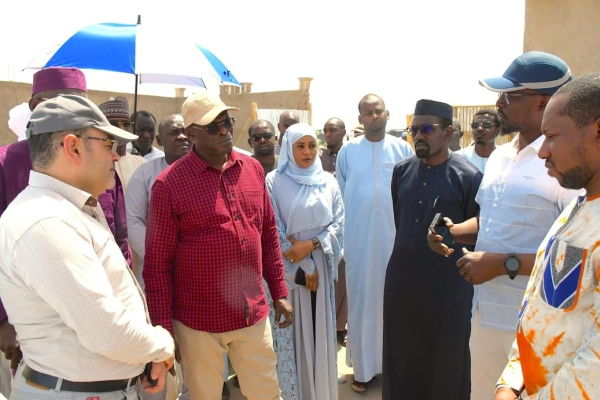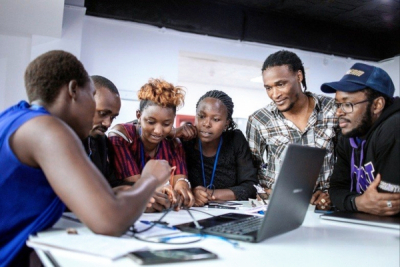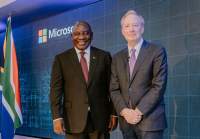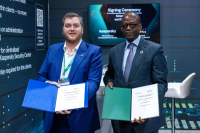In January 2025, the fintech secured $53 million in a Series B funding round, led by Highland Europe, bringing its total funding to $85 million. The company plans to use these funds to establish itself as the primary financial services platform for immigrants.
LemFi is a fintech solution developed by a Nigerian startup, enabling diaspora communities in Europe and North America to transfer funds from African countries. Founded in 2021 by Ridwan Olalere and Rian Cochran as Lemonade Finance, the company rebranded as LemFi in 2023.
In January, the Nigerian fintech raised $53 million to develop its products, strengthen its global presence as a financial services hub for immigrants, and support its growth. "This new funding will support us in our mission to build the financial services hub for immigrants globally from adding new features to expanding to new countries," said Ridwan Olalere.
The solution features a mobile application available on iOS and Android, where it has been downloaded more than a million times, according to Play Store data. Users create an account to access LemFi’s services. In addition to international money transfers, the fintech offers the creation of international accounts, requests for money from relatives, and the generation of payment links.
Transfers via LemFi can be made directly to bank accounts, mobile wallets, or other available options. Transaction fees are nonexistent for certain destinations and relatively low for others. The Nigerian startup is backed by various entities, including the California-based accelerator Y Combinator, which selected it for its Summer 2021 cohort.
By Adoni Conrad Quenum,
Editing by Feriol Bewa
The work on the Chadian component of the Trans-Saharan Fiber Optic Backbone was launched in May 2023. The project, assigned to the CGPS/LORYNE consortium, was initially scheduled to last ten months.
The Chadian government is urging the companies involved to speed up work on the Chadian component of the DTS project while ensuring that the quality of the installations is not compromised. According to authorities, the infrastructure is significantly behind schedule, with only 32% of the work completed.
Boukar Michel, Minister of Telecommunications, assessed the progress of the project on Thursday, March 6, during a field visit. He was accompanied by his colleagues and officials from entities under his ministry's supervision, including the Agency for ICT Development (ADETIC) and the Regulatory Authority for Electronic Communications and Postal Services (ARCEP).
This call comes after an intervention by Boukar Michel in May 2024, when he expressed concern over the slow progress and announced that a “drastic decision” would be taken. During another visit in October, the minister, accompanied by representatives from the European Union (EU) and the African Development Bank (AfDB), acknowledged some progress, albeit moderate, while stating that the work would be completed by the end of 2024 or early 2025.
The Chadian component of the DTS is a key element of Chad’s digital connectivity strategy. Lacking direct access to the sea and submarine cables, the country relies on its neighbors, particularly Cameroon and Sudan, for its connection to the international Internet. This infrastructure is also expected to facilitate interconnection with countries such as Niger, Mali, Nigeria, Mauritania, and Algeria. Official discussions with Egypt were also initiated in December 2024, paving the way for further collaborations.
"For dynamic electronic communication, a highway is needed for digital data traffic, and today, the most suitable highway is fiber optics. This is why the government, with the support of its partners, is committed to developing information and communication technologies (ICTs),” the Ministry of Telecommunications stated in a press release published on its Facebook page.
By Isaac K. Kassouwi,
Editing by Sèna D. B. de Sodji
Securing identity authentication is a critical challenge across online transactions, public services, and data protection. Given the swift evolution of fraud techniques, enhanced by technological progress, African nations are compelled to reinforce their systems without delay.
Generative artificial intelligence (AI), a rapidly growing technology, is revolutionizing numerous sectors. However, in Africa, as elsewhere, it is also being exploited for malicious purposes. Fraudsters are using these tools to create fake documents, synthetic voices, and hyper-realistic images, facilitating sophisticated scams and financial crimes. This new wave of AI-driven fraud presents major challenges in security and identity verification, according to Smile ID's report, "2025 Digital Identity: Fraud in Africa Report – Trends, Tactics, and Key Solutions to Tackle Fraud Effectively."
Biometric Fraud Explosion
One of the most concerning aspects of this trend is the increase in biometric fraud attacks. With the availability of free or low-cost AI tools, fraudsters can now produce deepfakes (fake videos or audio recordings) and high-quality fake selfies. According to recent data, deepfake-related incidents increased sevenfold between the second and fourth quarters of last year. Selfie anomalies, used to bypass verification systems, now account for 34% of emerging biometric fraud cases.
These techniques allow criminals to create fake identities or manipulate existing biometric data, making traditional security systems increasingly vulnerable. West Africa recorded the highest rise in biometric fraud cases in 2024. Cases of identity theft have increased in the region, representing 15% of biometric fraud cases, compared to less than 5% in 2023.
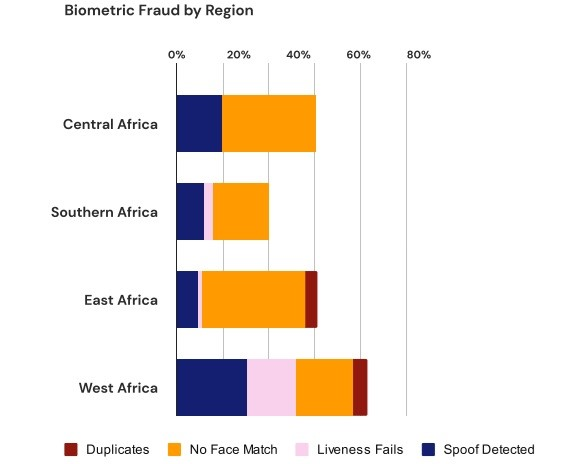
Traditional Verification Methods Under Threat
Faced with these technological advances, traditional identity verification methods seem increasingly outdated. Generative AI allows fraudsters to imitate individuals in real-time with unsettling realism. Security systems based on facial recognition or document verification are now vulnerable to high-quality falsifications.
Experts point out that the easy access to generative AI tools has paved the way for an industrialization of fraud. Criminals can mass-produce fake documents, photos, and videos, exposing major flaws in current protection systems. Among the most striking examples of this new era of fraud is OnlyFake, an underground platform that uses advanced neural networks to produce impressively high-quality fake identity documents. For just $15 per document, users can generate convincing documents capable of deceiving digital verification systems. OnlyFake perfectly illustrates how generative AI has eliminated the technical barriers once exclusive to expert counterfeiters.
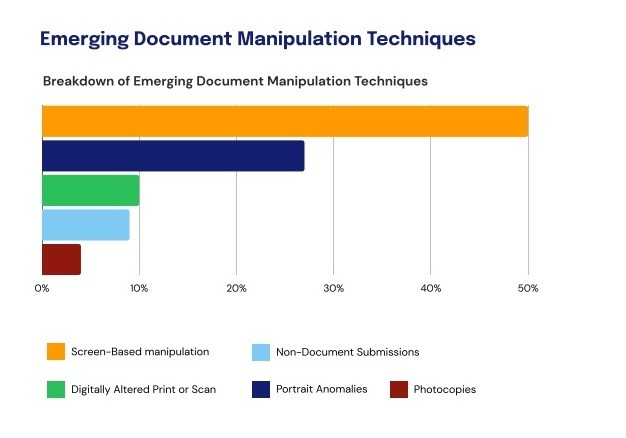
Beyond the use of AI, which is growing in biometric fraud, Smile ID indicates that other techniques are also being implemented, notably document fraud and identity farming.
Document fraud involves manipulating or falsifying identity documents. This includes counterfeiting, altering genuine documents, and obscuring essential information. Emerging techniques include on-screen document manipulation, portrait anomalies, and the submission of altered photocopies or scanned documents.
As for identity farming, it involves collecting large amounts of personal information, often through illegal means, to facilitate fraud. This data is used to create synthetic identities, take control of existing accounts, or open fraudulent accounts.
Increasing Financial Losses
The growing use of identity fraud techniques in Africa has had significant consequences. Despite improvements in Know Your Customer (KYC) processes, financial losses due to fraud have increased in major markets. In Nigeria, banks reported losses of 42.6 billion naira ($28.2 million) due to fraud in the second quarter of 2024 alone, surpassing the total losses of 9.4 billion naira for the entire year 2023. Similar trends have been observed in South Africa, Ghana, Zambia, and other key African markets.
East Africa recorded the highest rate of reported biometric and document fraud attempts in Africa, at 27% in 2024. According to Smile ID, this phenomenon is mainly due to outdated, inconsistent, and low-quality identity documents in countries such as Zambia, Rwanda, and Sudan, which continue to hinder verification processes. West Africa saw a significant increase in its rate from 12% in 2023 to 22% in 2024, due to the rise in biometric fraud attempts. Central and Southern Africa recorded respective rates of 22% and 21%.
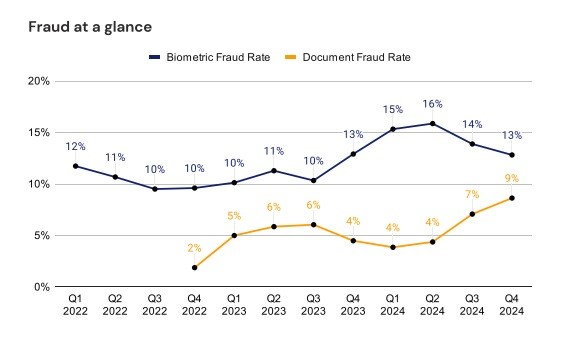
Digital banks recorded a peak in fraud attempts, accounting for 35% of all biometric and document verifications in 2024, followed by microfinance at 30%. These institutions remain prime targets for sophisticated schemes combining identity fraud, account takeovers, and money laundering.
National identity cards recorded the highest fraud rate in Africa in 2024, at 27%, reflecting their widespread use as the main form of identification. Driver’s licenses followed at 24%, due to their frequent use in both formal and informal contexts, increasing their exposure to misuse. Passports had a fraud rate of 20%.
Race Against Time
To address this threat, governments, financial institutions, and technology companies must step up their efforts. Innovative solutions, such as integrating AI to detect deepfakes or strengthening biometric verification systems, are already being explored. However, the speed at which fraudsters adapt their techniques makes this race against time particularly complex.
In Africa, where digital security systems are still developing in many countries, the impact of these frauds could be devastating. International collaboration and increased investment in detection technologies will be essential to counter this growing threat, Smile ID emphasizes. Generative AI, while promising in many areas, thus presents a dual challenge for the continent: harnessing its potential while protecting against its malicious uses.
Africa's mobile internet market is rapidly expanding, fueled by rapid digital growth, a young and connected population, and substantial investments in telecommunications infrastructure.
Sub-Saharan Africa's monthly mobile data traffic per connection is projected to nearly quadruple by 2030, increasing by almost six gigabytes (GB), according to the GSMA. This growth will be driven by the expansion of high-speed mobile network coverage and rising demand for data-intensive content, such as gaming and video streaming.
The Economic Community of Central African States (ECCAS) will see particularly strong growth, with monthly mobile data traffic expected to increase sixfold. Countries like Angola, Chad, and Equatorial Guinea could see a tenfold increase. However, mobile data consumption in the region is projected to remain below the Sub-Saharan African average of eight GB due to lower 4G and 5G penetration rates.
The Economic Community of West African States (ECOWAS) is expected to have the highest mobile data traffic in Sub-Saharan Africa by 2030, reaching 10.1 GB.
The GSMA also indicates that the growth of mobile data traffic in Sub-Saharan Africa will be fueled by greater smartphone adoption. It estimates smartphone adoption rate will rise from 51% in 2023 to 81% in 2030. ECOWAS is expected to be the most dynamic region due to its swift implementation of necessary actions to develop the telecom sector. Its smartphone adoption rate, which stood at 54% in 2023, is projected to reach 83% by 2030.
By then, the five largest smartphone markets in Sub-Saharan Africa are expected to be Nigeria (230 million connections), South Africa (140 million), Ethiopia (97 million), Tanzania (92 million), and Kenya (72 million).
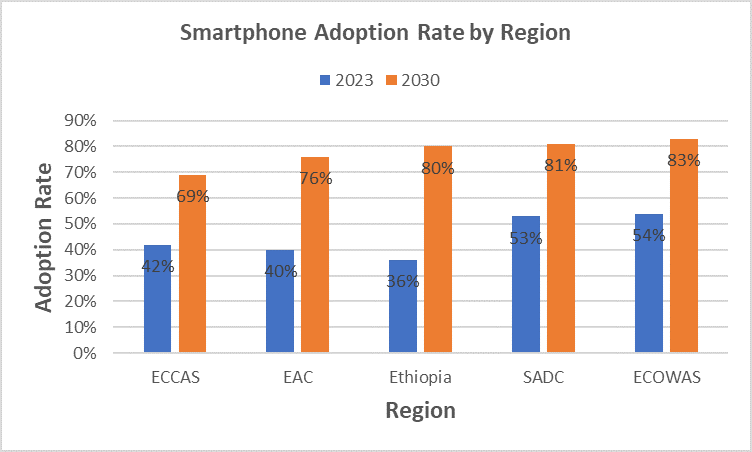
The number of mobile phone service consumers will also be highest in the ECOWAS region.
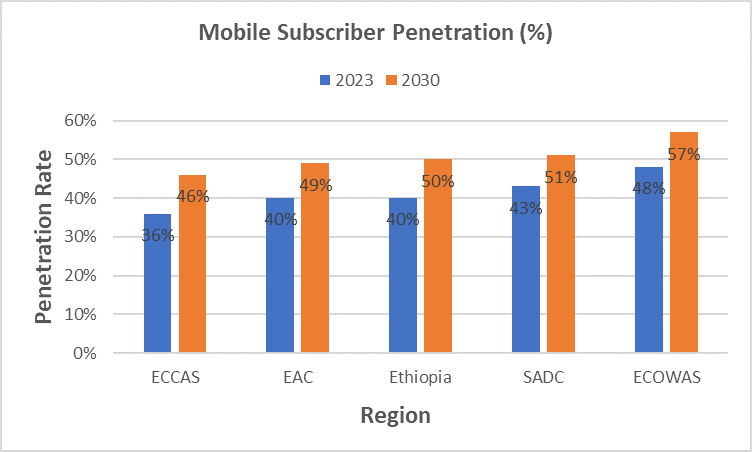
“By 2030, the economic contribution of mobile telecommunications in Sub-Saharan Africa will reach $170 billion. This growth will primarily stem from the continued expansion of the mobile ecosystem and its spillover effects on other sectors, as they increasingly benefit from the productivity and efficiency gains driven by mobile service adoption,” the GSMA stated. In 2023, the mobile industry contributed $140 billion to Sub-Saharan Africa’s economy.
However, for all of GSMA’s projections to materialize, Sub-Saharan African governments must take the necessary measures to encourage telecom operators to invest in networks. Otherwise, mobile network investment is expected to decline after 2027, despite relatively increasing revenues.
Special attention must also be given to smartphone affordability to promote its adoption and facilitate internet access for populations. GSMA recommends eliminating sector-specific excise duties on mobile telecommunications services, including customs duties on mobile phones, reducing VAT rates, and scrapping fixed consumer taxes (such as activation or numbering taxes) that make these services less affordable.
Muriel Edjo
Nigerian authorities are leveraging digital technology to enhance public service quality, with a goal of digitizing 75% of those services by 2027.
The Nigerian government plans to streamline citizen access to public digital services with a newly unveiled digital public infrastructure framework. The framework, designed to support citizens throughout their lives, will create a platform ensuring interoperability across all public services.
"[The framework] will also ensure that technology applications in government are designed and operated without silos, while recognizing the responsibilities and mandates of various ministries, departments, and agencies of government across all tiers of government in Nigeria," said Bosun Tijani, Minister of Communications, Innovation, and Digital Economy, in a post on X, formerly Twitter, on Tuesday, March 4. He added that this integrated government approach will leverage private sector capabilities to develop services for the public.
This initiative is expected to accelerate Nigeria's digital transformation. According to the World Bank, digital public infrastructure (DPI), encompassing digital identity, digital payments, and data sharing, serves as an intermediary between physical infrastructure and sectoral applications. The World Bank believes countries with robust DPI can sustain public services, commerce, hospitals, schools, and other activities through online channels.
The framework's development aligns with the government's goal to digitize 75% of public services by 2027. Meanwhile, the United Nations ranked Nigeria 144th out of 193 countries in the 2024 e-Government Development Index (EGDI), with a score of 0.4815 out of 1. While Nigeria's score exceeds the West African average of 0.3957 and the African average of 0.4247, it remains below the global average. In the online services category, Nigeria scored 0.5372.
However, the Nigerian government has not yet specified a timeline for implementing the DPI framework. Its successful implementation will depend significantly on the country's existing digital infrastructure, including internet connectivity, devices, servers, data centers, cloud services, and routers. In the EGDI's "telecommunications infrastructure" component, Nigeria scored 0.4836 out of 1.
By Isaac K. Kassouwi,
Editing by Sèna D. B. de Sodji
Google has opened applications for its 2025 Hustle Academy, a free five-day virtual bootcamp for small businesses in Kenya, Nigeria, and South Africa. The announcement was made on March 6.
The program will equip entrepreneurs with AI skills, digital tools, and strategies to drive growth and efficiency.
Led by expert trainers, the bootcamp features live sessions, personalized mentorship, and networking opportunities. Participants will learn to integrate AI into their operations, enhancing competitiveness in a digital economy.
Expanding access to cloud and AI tools paves the way for small businesses, startups, and government services to embrace digital transformation, enhancing efficiency and accessibility. With this investment, South African businesses will be better positioned to integrate AI and cloud computing, driving productivity gains and streamlining operations.
On March 6, Microsoft announced plans to invest ZAR 5.4 billion ($297,664,532) in South Africa to expand its cloud and AI infrastructure by the end of 2027. This investment will support the growing demand for Azure services while enabling businesses, government entities, and startups to harness the power of AI and cloud computing to drive efficiency and innovation.
Speaking on the announcement, President Cyril Ramaphosa emphasized the significance of Microsoft’s long-standing commitment to South Africa, stating: “The strategic investment announcements made by Microsoft today stands as further testimony to this enduring confidence. They signal to the business and investor community that South Africa’s economy continues to hold immense potential and that it is a favourable place to do business where their investments are secure.”
As part of its commitment, Microsoft plans to expand its digital skills initiative over the next 12 months by sponsoring 50,000 Microsoft Certifications in high-demand fields such as AI, data science, cybersecurity, and cloud computing.
This investment builds on Microsoft’s 2024 achievements, where the company trained 150,000 people, certified 95,000, and helped 1,800 secure employment through its Skills for Jobs program. In January this year, Microsoft announced plans to provide 1 million people in South Africa with artificial intelligence (AI) training opportunities by 2026.
South Africa grapples with a significant digital skills gap, limiting its capacity to compete effectively in the global digital economy. A 2020 survey by Harambee, South Africa's Youth Employment Accelerator, titled Mapping of Digital and ICT Roles and Demand for South Africa, found that the country's shortage of technical skills led to the outsourcing of over 28,800 digital and ICT jobs each year. This resulted in an estimated annual loss of R8.5 billion ($55 million) in export revenue. Efforts like Microsoft’s initiative seek to bridge the gap by strengthening digital competencies across multiple sectors.
By strengthening its cloud and AI infrastructure, Microsoft aims to empower South Africa and the broader continent with the tools needed to compete globally, foster local enterprise development, and drive economic growth.
Hikmatu Bilali
The rising tide of cyberattacks poses a significant challenge to Africa's economic stability and digital development. Enhanced cooperation is essential to safeguard the continent's infrastructure.
Cybersecurity firm Kaspersky signed a three-year strategic memorandum of understanding with Smart Africa, an alliance of more than 40 African countries committed to the continent’s digital transformation, on Wednesday, March 5. The partnership aims to strengthen cybersecurity in Africa through skills development, policy harmonization, and the reinforcement of critical infrastructure.
"This MoU marks a significant milestone in our quest to secure Africa’s digital future. By joining forces with Kaspersky, we are not only building essential cybersecurity skills and bridging the gender gap but also setting the stage for robust regional cooperation and state-of-the-art cyber infrastructure," said Lacina Koné, CEO of Smart Africa.
The initiative is part of a broader effort to improve the digital resilience of African nations. According to the United Nations Economic Commission for Africa, the low level of cybersecurity preparedness costs African states an average of 10% of their GDP, amounting to nearly $4 billion per year, solely due to cybercrime. The African Network of Cybersecurity Authorities (ANCA), recently launched by Smart Africa, represents a first step toward more effective intergovernmental cooperation on cybersecurity.
Through the agreement, Africa will benefit from advanced training programs via the Kaspersky Academy, support in developing appropriate regulatory frameworks, and the establishment of security operations centers (SOCs). By making cybersecurity a priority in the continent’s digital transformation, the collaboration aims to create a safer, more inclusive, and resilient digital space for the years ahead.
By Samira Njoya,
Editing by Sèna D. B. de Sodji
Mobile payments are rapidly expanding across Africa, significantly increasing access to financial services. Leading providers like Orange Money are at the forefront of this digital shift, delivering innovative and accessible solutions tailored to the local population.
Orange Money Burkina Faso announced the upgrade of its mobile financial services platform with Mobiquity® Pay X, a next-generation solution developed by Comviva, at the Mobile World Congress (MWC) in Barcelona on Wednesday, March 5. The evolution aims to enhance innovation and provide an improved user experience for Orange Money customers in Burkina Faso.
"Orange Money is one of our key growth drivers, contributing significantly to economic and social development in Burkina Faso. We are particularly impressed by Mobiquity® Pay's microservices architecture, open design, and API-first philosophy, which will enable us to significantly expand the Orange Money ecosystem in the region and provide disruptive services to our customers," said Christophe Baziemo, CEO of Orange Money Burkina Faso.
The mobile financial services market in West Africa is experiencing strong expansion, driven by the rise of digital payments and operators' initiatives to strengthen financial inclusion. According to the financial results of the Orange Côte d'Ivoire Group, which includes Orange Burkina Faso, the group closed 2024 with consolidated revenue of 1,084.1 billion CFA francs ($1.8 billion), a 6.6% increase. This performance is primarily fueled by key sectors such as mobile data, Orange Money, and fiber, illustrating the growing demand for mobile financial services in the region.
The new cloud-based platform represents a cutting-edge solution offering a comprehensive suite of information management services, particularly for digital money, wallets, and payments. Its robust and scalable architecture ensures a secure and user-friendly experience, while enhanced modularity enables faster market deployment of new services.
With over ten years of expertise in digital payments, Comviva has deployed its Mobiquity® Pay platform in more than 60 projects across 45 countries. This modernization is expected to enable Orange Money Burkina Faso to launch new services more quickly, improve interoperability with other financial systems, and enhance transaction security. Ultimately, the initiative will help boost the mobile payments ecosystem and promote greater financial inclusion in the country.
By Samira Njoya,
Editing by Sèna D. B. de Sodji
Global digital transformation is reshaping industries, and the automotive sector is no exception, with the increasing integration of information and communication technology (ICT) in vehicles. Tunisia is strategically positioning itself to capitalize on these emerging technologies, particularly electric and smart vehicles.
Tunisia is positioning itself to become a major player in the smart vehicle industry, as highlighted during the second steering committee meeting of the "Automotive Smart City" project on Tuesday, March 4. The initiative aims to establish a smart city dedicated to the electric and intelligent vehicle sector, enhancing Tunisia’s role as a strategic hub and boosting its global competitiveness.
The smart vehicle market is expanding rapidly, driven by advancements in artificial intelligence, connectivity, and autonomous driving technologies. A report by consulting firm Modor Intelligence estimates that the automotive artificial intelligence market, valued at $2.3 billion in 2024, will grow to $16.2 billion by 2026, fueled by strong consumer demand and government efforts to reduce carbon emissions.
Tunisia’s Minister of Industry, Mines, and Energy, Fatma Thabet Chiboub, said the project aligns with the country’s national strategy for industry and innovation. It also supports the Pact for the Competitiveness of the Automotive Equipment and Components Manufacturing Sector by 2027. The initiative is expected to increase export revenues to 13.5 billion dinars ($4.4 billion) by 2027 and create 150,000 new jobs in the coming years.
The project is part of broader efforts to strengthen Tunisia’s automotive sector, which has already demonstrated significant growth. Tunisia ranks second in Africa for automotive component exports, underscoring the sector’s potential and its growing contribution to the national economy.
By Samira Njoya,
Editing by Sèna D. B. de Sodji
More...
Many small businesses still operate in cash-based systems with limited access to digital financial services. This initiative ensures that more businesses can participate in the digital economy, improving efficiency and security.
Payments technology company Flutterwave has partnered with the Small and Medium Enterprises Development Agency of Nigeria (SMEDAN) to enhance digital payment solutions for micro, small, and medium enterprises (MSMEs) across the country. This collaboration aims to provide businesses with the tools they need to thrive in an increasingly digital economy.
Flutterwave CEO Olugbenga ‘GB’ Agboola emphasized the company’s dedication to supporting Nigerian businesses. “As a business with Nigerian roots, we understand the challenges that small businesses face daily. This partnership ensures they have the financial tools they need to succeed in today’s digital economy.” By leveraging Flutterwave’s technology, MSMEs will be better equipped to navigate the evolving business landscape.
Aligned with SMEDAN’s Grow Nigerian initiative, the partnership will provide MSMEs with secure digital storefronts, seamless payment solutions, and improved financial access. Through this, businesses will be able to accept payments globally via mobile wallets, card payments, and bank transfers enhancing their reach and competitiveness.
Highlighting the impact of this initiative, SMEDAN Director-General and CEO Charles Odii noted, “One of the biggest challenges MSMEs face is access to digital tools, financial resources, and training that can help them scale. With Flutterwave as our partner, we have a solid ally providing Nigerian businesses with innovative solutions that will enable them to compete effectively on a global scale.”
Building on its longstanding support for small businesses, Flutterwave has consistently introduced initiatives such as the Flutterwave Store, small business grants, annual trade fairs, and the ‘Keeping the Lights On’ campaign, which has helped thousands of businesses remain operational despite economic challenges. The partnership with SMEDAN further strengthens Flutterwave’s commitment to empowering entrepreneurs.
This latest development follows NITDA’s February announcement of a partnership with Flutterwave, Alami a fintech offering sharia-compliant financing for SMEs and SMEDAN. Together, these initiatives signal a broader push toward digital and financial inclusion for small businesses in Nigeria.
The significance of this collaboration is further underscored by the role SMEs play in Nigeria’s economy. According to the International Labour Organization (ILO) Country Office in Nigeria, SMEs contribute 48% of the national GDP, make up 96% of all businesses, and provide 84% of employment. As digital solutions become increasingly critical to business success, partnerships like this one will help ensure that Nigerian MSMEs remain competitive and continue to drive economic growth.
Hikmatu Bilali
Access to quality vocational training remains a major challenge for many African workers and entrepreneurs. To address this issue, Zydii, a Kenya-based edtech company, offers an innovative solution.
Zydii, a Kenyan startup, has developed an online training platform designed to meet the needs of African professionals, including employees and entrepreneurs. Founded in Nairobi in 2021 by Joyce Mbaya and Rhoda Kingori, Zydii offers a mobile application available exclusively on Android.
According to Play Store data, the application has been downloaded approximately one hundred times. Users create an account to access various online training programs covering key areas such as personal development and leadership, digital and technological skills, and entrepreneurship and business management.
In February 2025, Zydii partnered with the talent accelerator Venture for Africa (VFA) to launch a hands-on, execution-focused go-to-market strategy course designed for African businesses. "This partnership with Venture for Africa is about giving businesses the tools to navigate real challenges, from market entry to regional expansion. Think of it as the ultimate playbook for winning in African markets," said Rhoda Kingori.
In a context where companies struggle to find talent trained in market-relevant skills, Zydii aims to bridge this gap by offering training programs tailored to the realities of the continent. The courses are designed to meet the demands of the African job market, with practical modules that can be immediately applied in a professional setting.
Zydii also collaborates with companies seeking to enhance their employees' skills. Through customized solutions, organizations can train their teams continuously and effectively, without time or location constraints.
By Adoni Conrad Quenum,
Editing by Feriol Bewa
Africa, with its vast territories and growing population, faces an urgent need for digital connectivity. Despite progress made, many regions remain excluded from Internet access, hindering their economic and social inclusion in an increasingly digital world.
Orange Africa and Middle East (OMEA) and French satellite company Eutelsat announced a partnership on Tuesday, March 3, to accelerate the deployment of satellite internet across Africa and the Middle East. The goal is to reduce the digital divide in these regions by providing reliable and affordable high-speed access, particularly in underserved "white zones" lacking connectivity.
"This partnership illustrates our commitment to connecting all territories and bridging the digital divide in Africa and the Middle East. Today, Orange serves more than 160 million customers in the region, and is pursuing its ambition to provide digital access for all," said Jérôme Hénique, CEO of Orange Africa and Middle East.
The partnership leverages the Eutelsat Konnect satellite, an advanced technology enabling download speeds of up to 100 Mbps. Initial deployments will focus on Côte d'Ivoire, Senegal, and the Democratic Republic of Congo, with plans to gradually expand across the region. The initiative aims to bridge the connectivity gap in remote areas by providing tailored solutions for both individuals and businesses.
The agreement reflects a shared commitment to reducing the digital divide by offering high-speed access to currently underserved regions. According to the "The Mobile Economy Sub-Saharan Africa 2024" report by the GSMA, Sub-Saharan Africa is the world's least connected region, with only 27% of the population using mobile internet services, leaving a 13% coverage gap and a 60% usage deficit.
By combining Orange’s telecommunications expertise with Eutelsat’s technological innovation in satellite services, the partnership is expected to deliver tailored offerings for both individuals and businesses, ensuring secure, reliable, and high-performance connectivity. The complementarity of fixed, mobile, and satellite technology solutions will help connect isolated areas and meet the growing demand for internet access in the region.
By Samira Njoya,
Editing by Sèna D. B. de Sodji
In its bid to grow its digital sector, Tunisia, like other African nations, is pursuing international partnerships, recently strengthening ties with India and France.
Tunisia and Italy discussed enhancing their information and communication technology (ICT) cooperation during a meeting on Monday, March 3, between Tunisian Minister of Communication Technologies Sofiene Hemissi (photo, right) and Italian Ambassador to Tunisia Alessandro Prunas (photo, right).
During the discussions, both parties emphasized areas related to promoting innovation, supporting entrepreneurship, and developing startups.
This potential cooperation could bolster the Tunisian government's digital transformation ambitions, a key pillar of its socioeconomic development strategy. In 2024, Tunisia ranked 87th globally in the United Nations' E-Government Development Index (EGDI), with a score of 0.6935 out of 1, surpassing both African and global averages. In cybersecurity, Tunisia was classified in the third category out of five by the International Telecommunication Union (ITU). The country acknowledges the need for further efforts in organizational measures, capacity building, and cooperation.
Italy, meanwhile, is recognized as a leader in cybersecurity. According to the ITU, this reflects a strong commitment to cybersecurity through coordinated and government-led actions. This includes the assessment, establishment, and implementation of generally accepted cybersecurity measures across all five pillars or up to all indicators. Italy also has an EGDI of 0.8355 out of 1, ranking 51st globally.
The discussions are in their early stages. The exact scope of the potential collaboration remains undefined, and no official agreement has been announced. The progress of negotiations will be monitored to provide further insight into the direction and potential implications.
By Isaac K. Kassouwi,
Editing by Sèna D. B. de Sodji



